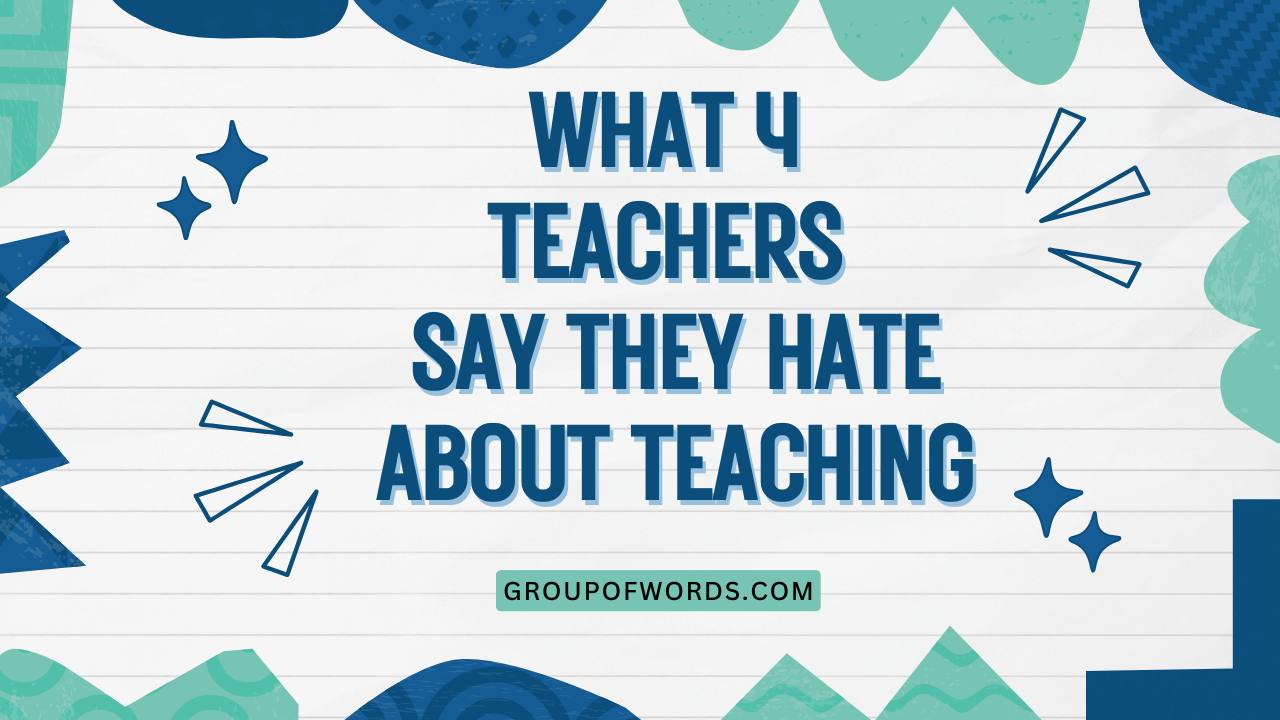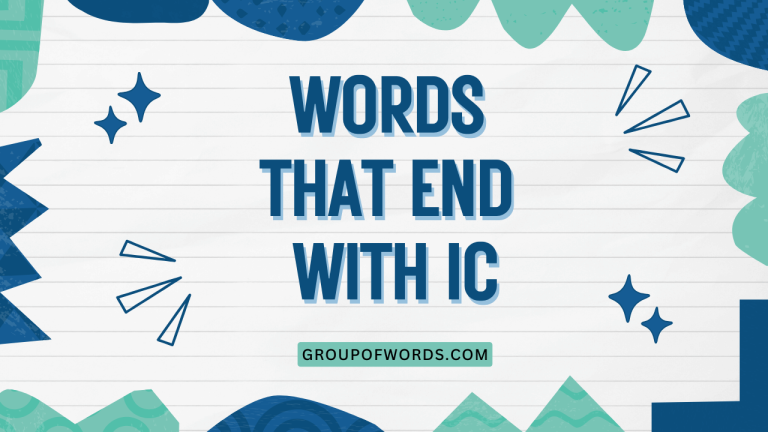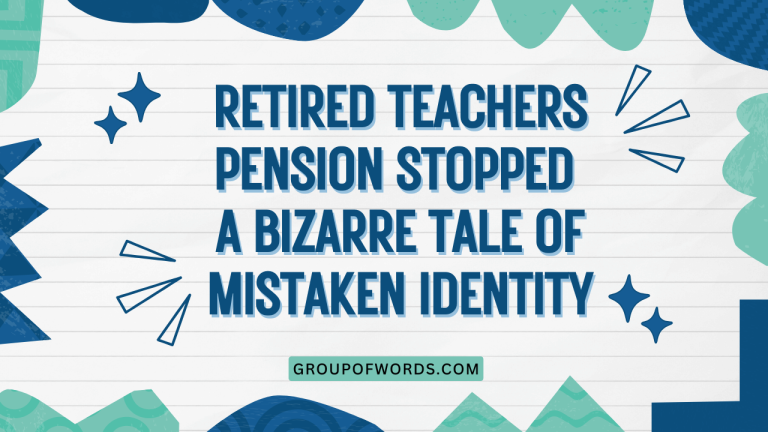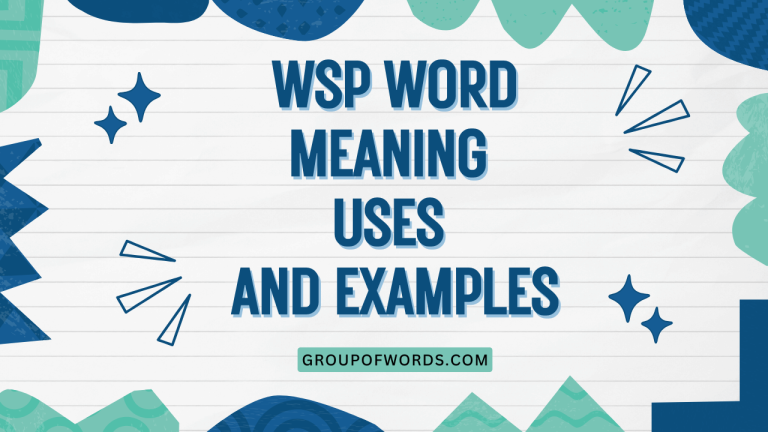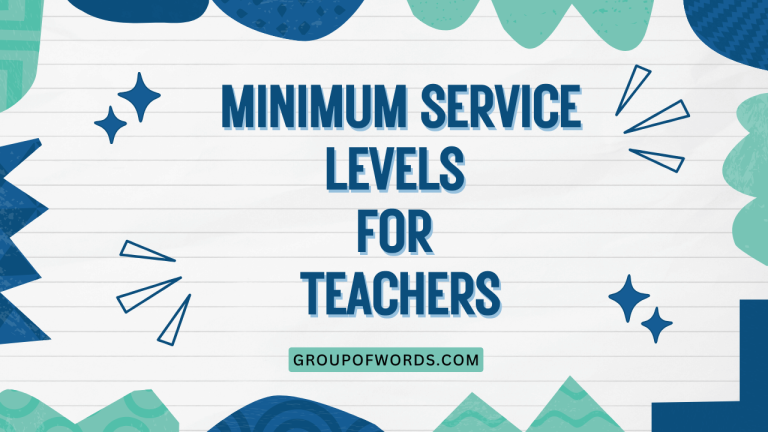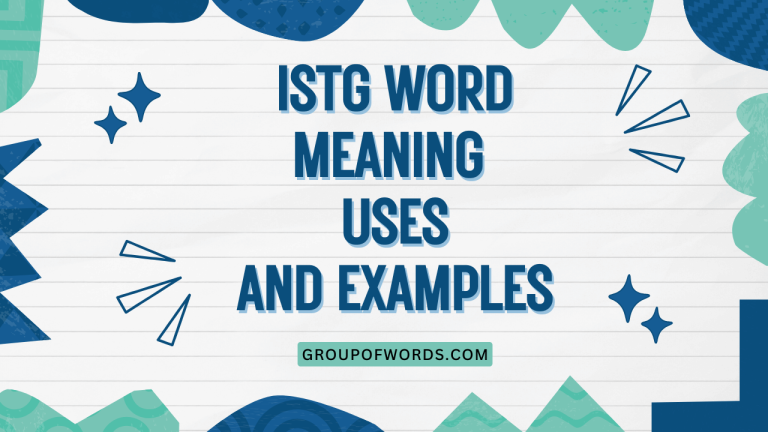Four Teachers’ Grammar Gripes: Common Pet Peeves Explained
Understanding the nuances of English grammar is crucial for effective communication, whether you’re writing an academic paper, crafting a business email, or simply engaging in everyday conversation. While grammar rules provide a framework, certain grammatical errors and stylistic choices consistently irritate educators.
This article delves into four common grammar pet peeves of teachers, offering comprehensive explanations, examples, and practice exercises to help you avoid these pitfalls and improve your writing skills. This guide is beneficial for students, writers, and anyone seeking to enhance their understanding of English grammar and refine their communication abilities.
By mastering these concepts, you will not only avoid common errors but also demonstrate a greater command of the English language, leading to clearer, more persuasive, and more professional communication. This guide will also promote a higher level of confidence in your writing and speaking skills.
This article will benefit students, writers, and professionals who aim to improve their grammar and communication skills.
Table of Contents
- Introduction
- The Grammar Gripes Defined
- Structural Breakdown
- Types and Categories of Errors
- Examples of Common Errors
- Usage Rules and Guidelines
- Common Mistakes and How to Avoid Them
- Practice Exercises
- Advanced Topics
- Frequently Asked Questions
- Conclusion
The Grammar Gripes Defined
Teachers often encounter specific grammar errors that detract from student writing. This article focuses on four common pet peeves: incorrect use of “there,” “their,” and “they’re”; confusion between “affect” and “effect”; misuse of commas, particularly comma splices and missing commas; and the overuse of passive voice.
“There,” “Their,” and “They’re”
These three words are homophones, meaning they sound alike but have different meanings and spellings. Understanding their distinct functions is crucial for clear writing.
- There: Indicates a place (“The book is over there”) or is used as an expletive to introduce a sentence (“There are many stars in the sky”).
- Their: A possessive pronoun indicating ownership (“They love their new car”).
- They’re: A contraction of “they are” (“They’re going to the park”).
“Affect” and “Effect”
These words are often confused because they sound similar and share related meanings. However, they function as different parts of speech in most contexts.
- Affect: Primarily a verb meaning to influence or produce an effect upon (“The weather will affect our plans”).
- Effect: Primarily a noun meaning a result or consequence (“The effect of the rain was flooding”). It can also be a verb meaning to bring about or accomplish (“The new policy will effect positive change”), though this usage is less common.
Comma Misuse
Commas are essential for clarity and readability, but they are often misused or omitted. Two common errors are comma splices and missing commas.
- Comma Splice: Occurs when two independent clauses are joined together with only a comma (Incorrect: “The sun was shining, the birds were singing.”).
- Missing Comma: Occurs when a comma is needed for clarity, such as after an introductory phrase or to separate items in a series (Incorrect: “Despite the rain we went for a walk.”).
Overuse of Passive Voice
The passive voice is a grammatical construction in which the subject of the sentence receives the action, rather than performing it. While the passive voice has its uses, overusing it can make writing unclear and weak.
- Passive Voice: The subject receives the action (“The ball was thrown by the boy.”).
- Active Voice: The subject performs the action (“The boy threw the ball.”).
Structural Breakdown
To understand how to correct these common errors, it’s important to understand the underlying grammatical structures involved. This section breaks down the structure of each error.
“There,” “Their,” and “They’re” Structure
Each word has a distinct grammatical function that determines its placement and usage in a sentence. Let’s look at the structure of each word.
- There: As an adverb of place, it typically follows a verb or preposition. As an expletive, it begins a sentence, followed by a verb (usually a form of “be”).
- Their: As a possessive pronoun, it precedes the noun it modifies, indicating ownership or belonging.
- They’re: As a contraction, it consists of the pronoun “they” and the verb “are,” always followed by a verb or adjective that describes “they.”
“Affect” and “Effect” Structure
Understanding the parts of speech of “affect” and “effect” is critical to use them correctly.
- Affect: As a verb, it typically follows a subject and precedes an object that is being influenced.
- Effect: As a noun, it often follows articles (a, an, the) or possessive pronouns. As a verb (less common), it follows a subject and precedes an object that is being brought about.
Comma Misuse Structure
Commas follow specific rules based on the clauses, phrases, and items they separate. Recognizing these structures is crucial for correct comma usage.
- Comma Splice: Consists of two independent clauses (each capable of standing alone as a sentence) joined only by a comma.
- Missing Comma: Occurs in various sentence structures, such as after introductory phrases, before coordinating conjunctions joining independent clauses, and between items in a series.
Passive Voice Structure
The passive voice is formed using a form of the verb “be” (is, are, was, were, been, being) followed by the past participle of the main verb. The structure is as follows:
- Passive Voice: Subject + Be verb + Past Participle + (by + Agent)
Types and Categories of Errors
Each of these grammar gripes can be broken down into specific types or categories, allowing for a more targeted approach to understanding and correcting them.
Types of “There,” “Their,” and “They’re” Errors
Errors involving these words typically fall into three categories:
- Substitution Errors: Using the wrong word in place of another (e.g., using “their” when “there” is needed).
- Contextual Errors: Using the correct word but in an inappropriate context (e.g., using “there” to show possession).
- Spelling Errors: Misspelling one of the words (e.g., writing “thier” instead of “their”).
Types of “Affect” and “Effect” Errors
Errors with “affect” and “effect” usually involve:
- Part of Speech Errors: Using the noun “effect” when the verb “affect” is needed, or vice versa.
- Contextual Misuse: Choosing the wrong word based on the intended meaning (e.g., using “affect” to mean “to bring about”).
Types of Comma Misuse
Comma errors can be categorized as:
- Comma Splices: Joining two independent clauses with only a comma.
- Missing Commas in Series: Failing to separate items in a list with commas (including the Oxford comma).
- Missing Commas After Introductory Elements: Omitting a comma after an introductory word, phrase, or clause.
- Unnecessary Commas: Adding commas where they are not grammatically required, disrupting the flow of the sentence.
Types of Passive Voice Issues
Problems related to the passive voice often include:
- Overuse: Using the passive voice when the active voice would be clearer and more direct.
- Obscuring the Agent: Omitting the “by” phrase that identifies the actor, making the sentence vague.
- Awkward Phrasing: Constructing sentences that are unnecessarily convoluted due to the passive voice.
Examples of Common Errors
To further clarify these concepts, let’s examine examples of each type of error, highlighting both incorrect and correct usages. The following tables offer a clear comparison to help you master these grammatical distinctions.
“There,” “Their,” and “They’re” Examples
The following table provides examples of correct and incorrect usages of “there,” “their,” and “they’re.”
| Category | Incorrect | Correct | Explanation |
|---|---|---|---|
| Location | Their is a park near my house. | There is a park near my house. | “There” indicates a place. |
| Possession | They’re dog is very friendly. | Their dog is very friendly. | “Their” shows ownership. |
| Contraction | There going to the beach. | They’re going to the beach. | “They’re” is a contraction of “they are.” |
| Location | I left my keys over their. | I left my keys over there. | “There” indicates a location. |
| Possession | The students forgot there books. | The students forgot their books. | “Their” indicates possession by the students. |
| Contraction | They are happy to be their. | They’re happy to be there. | “They’re” is a contraction of “they are,” and “there” indicates a location. |
| Introduction | Their are many reasons to learn grammar. | There are many reasons to learn grammar. | “There” introduces the existence of something. |
| Possession | The birds built there nest in the tree. | The birds built their nest in the tree. | “Their” indicates that the nest belongs to the birds. |
| Contraction | There excited about the trip. | They’re excited about the trip. | “They’re” is a contraction of “they are.” |
| Location | Is that your car over their? | Is that your car over there? | “There” refers to a specific location. |
| Possession | The children shared there toys. | The children shared their toys. | “Their” indicates that the toys belong to the children. |
| Contraction | There planning a party for Sarah. | They’re planning a party for Sarah. | “They’re” is a contraction of “they are.” |
| Location | We went over their yesterday. | We went over there yesterday. | “There” indicates a location. |
| Possession | The team celebrated there victory. | The team celebrated their victory. | “Their” indicates that the victory belongs to the team. |
| Contraction | There coming to visit us next week. | They’re coming to visit us next week. | “They’re” is a contraction of “they are.” |
| Location | Put the book over their, on the shelf. | Put the book over there, on the shelf. | “There” indicates a specific location. |
| Possession | The company announced there new policy. | The company announced their new policy. | “Their” indicates that the policy belongs to the company. |
| Contraction | There going to be late for the meeting. | They’re going to be late for the meeting. | “They’re” is a contraction of “they are.” |
| Introduction | Their is no doubt about her talent. | There is no doubt about her talent. | “There” introduces the existence of something. |
| Possession | The neighbors decorated there house for Christmas. | The neighbors decorated their house for Christmas. | “Their” indicates that the house belongs to the neighbors. |
| Contraction | There really looking forward to the vacation. | They’re really looking forward to the vacation. | “They’re” is a contraction of “they are.” |
| Location | Did you see the new store over their? | Did you see the new store over there? | “There” refers to a specific location. |
| Possession | The students presented there projects. | The students presented their projects. | “Their” indicates that the projects belong to the students. |
| Contraction | There arriving at 6 PM. | They’re arriving at 6 PM. | “They’re” is a contraction of “they are.” |
“Affect” and “Effect” Examples
The following table provides examples of correct and incorrect usages of “affect” and “effect.”
| Category | Incorrect | Correct | Explanation |
|---|---|---|---|
| Verb | The medicine had a positive affect on her health. | The medicine had a positive effect on her health. | “Effect” is used as a noun here, meaning result. |
| Noun | How will this decision effect our budget? | How will this decision affect our budget? | “Affect” is used as a verb here, meaning to influence. |
| Noun | The affect of the storm was devastating. | The effect of the storm was devastating. | “Effect” is the noun meaning result. |
| Verb | His words did not effect me. | His words did not affect me. | “Affect” is the verb meaning to influence. |
| Noun | The new law will have a significant affect. | The new law will have a significant effect. | “Effect” is the noun meaning consequence. |
| Verb | The weather will effect our travel plans. | The weather will affect our travel plans. | “Affect” is the verb meaning to influence. |
| Noun | What is the affect of pollution on the environment? | What is the effect of pollution on the environment? | “Effect” is the noun meaning result or consequence. |
| Verb | The news did not effect her mood. | The news did not affect her mood. | “Affect” is the verb meaning to influence. |
| Noun | The medication had a strange affect on him. | The medication had a strange effect on him. | “Effect” is the noun meaning result. |
| Verb | The changes will effect everyone in the company. | The changes will affect everyone in the company. | “Affect” is the verb meaning to influence or impact. |
| Noun | The affect of her speech was powerful. | The effect of her speech was powerful. | “Effect” is the noun meaning result or consequence. |
| Verb | The criticism did not effect his performance. | The criticism did not affect his performance. | “Affect” is the verb meaning to influence. |
| Noun | The movie had a profound affect on the audience. | The movie had a profound effect on the audience. | “Effect” is the noun meaning result or impact. |
| Verb | The new rules will effect student behavior. | The new rules will affect student behavior. | “Affect” is the verb meaning to influence. |
| Noun | The affect of the experiment was surprising. | The effect of the experiment was surprising. | “Effect” is the noun meaning result. |
| Verb | The noise will effect my concentration. | The noise will affect my concentration. | “Affect” is the verb meaning to influence. |
| Noun | The affect of the therapy was positive. | The effect of the therapy was positive. | “Effect” is the noun meaning result. |
| Verb | The layoff will effect many families. | The layoff will affect many families. | “Affect” is the verb meaning to influence or impact. |
| Noun | The affect of the policy change is still unknown. | The effect of the policy change is still unknown. | “Effect” is the noun meaning result or consequence. |
| Verb | Her decision will effect the company’s future. | Her decision will affect the company’s future. | “Affect” is the verb meaning to influence. |
Comma Misuse Examples
The following table provides examples of correct and incorrect usages of commas, specifically addressing comma splices and missing commas.
| Category | Incorrect | Correct | Explanation |
|---|---|---|---|
| Comma Splice | The cat sat on the mat, it looked very comfortable. | The cat sat on the mat; it looked very comfortable. / The cat sat on the mat, and it looked very comfortable. | Two independent clauses need a semicolon or a coordinating conjunction. |
| Missing Comma (Introductory Phrase) | After the concert we went for ice cream. | After the concert, we went for ice cream. | A comma is needed after an introductory phrase. |
| Missing Comma (Series) | I bought apples bananas and oranges. | I bought apples, bananas, and oranges. | Commas are needed to separate items in a series. |
| Comma Splice | She loves to read, he prefers to watch movies. | She loves to read; he prefers to watch movies. / She loves to read, but he prefers to watch movies. | Two independent clauses need a semicolon or a coordinating conjunction. |
| Missing Comma (Introductory Clause) | Because it was raining we stayed inside. | Because it was raining, we stayed inside. | A comma is needed after an introductory clause. |
| Missing Comma (Series) | He needed paper pencils and a ruler. | He needed paper, pencils, and a ruler. | Commas are needed to separate items in a series. |
| Comma Splice | The movie was great, I enjoyed it very much. | The movie was great; I enjoyed it very much. / The movie was great, and I enjoyed it very much. | Two independent clauses need a semicolon or a coordinating conjunction. |
| Missing Comma (Introductory Phrase) | Before leaving the house she grabbed her keys. | Before leaving the house, she grabbed her keys. | A comma is needed after an introductory phrase. |
| Missing Comma (Series) | She packed a swimsuit a towel and sunscreen. | She packed a swimsuit, a towel, and sunscreen. | Commas are needed to separate items in a series. |
| Comma Splice | The cake looks delicious, I want to try it. | The cake looks delicious; I want to try it. / The cake looks delicious, so I want to try it. | Two independent clauses need a semicolon or a coordinating conjunction. |
| Missing Comma (Introductory Clause) | If you need help just ask. | If you need help, just ask. | A comma is needed after an introductory clause. |
| Missing Comma (Series) | He likes to eat pizza burgers and fries. | He likes to eat pizza, burgers, and fries. | Commas are needed to separate items in a series. |
| Comma Splice | The book was interesting, I couldn’t put it down. | The book was interesting; I couldn’t put it down. / The book was interesting, so I couldn’t put it down. | Two independent clauses need a semicolon or a coordinating conjunction. |
| Missing Comma (Introductory Phrase) | After finishing his work he went for a walk. | After finishing his work, he went for a walk. | A comma is needed after an introductory phrase. |
| Missing Comma (Series) | She bought flowers chocolates and a card. | She bought flowers, chocolates, and a card. | Commas are needed to separate items in a series. |
| Comma Splice | The weather is beautiful, we should go outside. | The weather is beautiful; we should go outside. / The weather is beautiful, so we should go outside. | Two independent clauses need a semicolon or a coordinating conjunction. |
| Missing Comma (Introductory Clause) | Although it was late she continued working. | Although it was late, she continued working. | A comma is needed after an introductory clause. |
| Missing Comma (Series) | He needed a pen a notebook and an eraser. | He needed a pen, a notebook, and an eraser. | Commas are needed to separate items in a series. |
| Comma Splice | The coffee is strong, I feel very awake. | The coffee is strong; I feel very awake. / The coffee is strong, so I feel very awake. | Two independent clauses need a semicolon or a coordinating conjunction. |
| Missing Comma (Introductory Phrase) | Before starting the test read the instructions carefully. | Before starting the test, read the instructions carefully. | A comma is needed after an introductory phrase. |
| Missing Comma (Series) | She invited her friends her family and her coworkers. | She invited her friends, her family, and her coworkers. | Commas are needed to separate items in a series. |
Passive Voice Examples
The following table provides examples of sentences in both passive and active voice, highlighting the differences in clarity and directness.
| Category | Passive Voice | Active Voice | Explanation |
|---|---|---|---|
| General | The report was written by the committee. | The committee wrote the report. | The active voice is more direct and concise. |
| General | Mistakes were made. | Someone made mistakes. | The active voice identifies the actor. |
| General | The car was driven by John. | John drove the car. | The active voice is clearer. |
| General | The window was broken. | Someone broke the window. | Active voice provides more clarity and specificity. |
| General | The cake was eaten by us. | We ate the cake. | The active voice is more concise and engaging. |
| General | The letter was delivered by the mailman. | The mailman delivered the letter. | Active voice emphasizes the actor. |
| General | The problem was solved by the team. | The team solved the problem. | Active voice is more direct and easier to understand. |
| General | The song was sung by her. | She sang the song. | Active voice is more natural and impactful. |
| General | The door was opened by him. | He opened the door. | Active voice is more straightforward. |
| General | The picture was taken by Maria. | Maria took the picture. | Active voice is more engaging. |
| General | The house was built in 1950. | They built the house in 1950. | Active voice provides more context. |
| General | The food was cooked by my mother. | My mother cooked the food. | Active voice is more personal and direct. |
| General | The book was read by everyone. | Everyone read the book. | Active voice is more concise. |
| General | The decision was made by the board. | The board made the decision. | Active voice is more specific. |
| General | The flowers were planted by her. | She planted the flowers. | Active voice is more vivid. |
| General | The project was completed by the students. | The students completed the project. | Active voice is more informative. |
| General | The question was answered by him. | He answered the question. | Active voice is more direct and clear. |
| General | The car was washed by my brother. | My brother washed the car. | Active voice is more engaging and personal. |
| General | The rules were explained by the teacher. | The teacher explained the rules. | Active voice is more direct and informative. |
| General | The email was sent by her. | She sent the email. | Active voice is more concise and clear. |
Usage Rules and Guidelines
To avoid these common grammar pitfalls, adhere to the following usage rules and guidelines. These rules provide a framework for correct usage and help improve overall writing clarity.
“There,” “Their,” and “They’re” Rules
- Use “there” to indicate a place or to begin a sentence.
- Use “their” to show possession or ownership.
- Use “they’re” as a contraction for “they are.”
“Affect” and “Effect” Rules
- Use “affect” as a verb to mean “to influence.”
- Use “effect” as a noun to mean “result” or “consequence.”
- Remember that “effect” can also be a verb meaning “to bring about,” but this usage is less common.
Comma Misuse Rules
- Do not join two independent clauses with only a comma (avoid comma splices). Use a semicolon, coordinating conjunction (and, but, or, nor, for, so, yet), or separate the clauses into two sentences.
- Use a comma after an introductory phrase or clause.
- Use commas to separate items in a series (including the Oxford comma).
- Avoid unnecessary commas that disrupt the flow of the sentence.
Passive Voice Rules
- Use the active voice whenever possible for clearer and more direct writing.
- Reserve the passive voice for situations where the actor is unknown, unimportant, or when you want to emphasize the action rather than the actor.
- When using the passive voice, ensure the sentence is still clear and easy to understand.
Common Mistakes and How to Avoid Them
Even with a good understanding of the rules, it’s easy to make mistakes. This section addresses common errors and provides strategies for avoiding them.
“There,” “Their,” and “They’re” Mistakes
- Mistake: Confusing “their” with “there” in sentences indicating location.
- Correction: Always double-check whether you’re referring to a place or indicating possession.
- Mistake: Using “there” instead of “they’re” when meaning “they are.”
- Correction: Remember that “they’re” is a contraction. If you can substitute “they are” in the sentence, use “they’re.”
“Affect” and “Effect” Mistakes
- Mistake: Using “affect” as a noun.
- Correction: Remember that “affect” is primarily a verb. Use “effect” as the noun.
- Mistake: Using “effect” as a verb when you mean “to influence.”
- Correction: Use “affect” as the verb meaning “to influence.”
Comma Misuse Mistakes
- Mistake: Creating comma splices.
- Correction: Identify independent clauses and use a semicolon or coordinating conjunction to join them, or separate them into two sentences.
- Mistake: Forgetting commas after introductory phrases or clauses.
- Correction: Always include a comma after an introductory element.
- Mistake: Omitting the Oxford comma in a series.
- Correction: While optional in some style guides, using the Oxford comma can prevent ambiguity.
Passive Voice Mistakes
- Mistake: Overusing the passive voice, making writing vague and indirect.
- Correction: Review your writing and convert passive voice constructions to active voice whenever possible.
- Mistake: Omitting the agent (“by” phrase) in passive voice sentences, leaving the reader unsure who performed the action.
- Correction: If the actor is important, include the agent in the “by” phrase.
Practice Exercises
Test your understanding with these practice exercises. Identify and correct the errors in each sentence.
“There,” “Their,” and “They’re” Exercise
| Question | Answer |
|---|---|
| 1. There going to the store. | They’re going to the store. |
| 2. The students forgot there books. | The students forgot their books. |
| 3. Is that your car over their? | Is that your car over there? |
| 4. Their is a problem with the computer. | There is a problem with the computer. |
| 5. They’re dog is very cute. | Their dog is very cute. |
“Affect” and “Effect” Exercise
| Question | Answer |
|---|---|
| 1. The medicine had a positive affect on her health. | The medicine had a positive effect on her health. |
| 2. How will this decision effect our budget? | How will this decision affect our budget? |
| 3. The affect of the storm was devastating. | The effect of the storm was devastating. |
| 4. His words did not effect me. | His words did not affect me. |
| 5. The new law will have a significant affect. | The new law will have a significant effect. |
Comma Misuse Exercise
| Question | Answer |
|---|---|
| 1. The cat sat on the mat it looked very comfortable. | The cat sat on the mat; it looked very comfortable. / The cat sat on the mat, and it looked very comfortable. |
| 2. After the concert we went for ice cream. | After the concert, we went for ice cream. |
| 3. I bought apples bananas and oranges. | I bought apples, bananas, and oranges. |
| 4. She loves to read he prefers to watch movies. | She loves to read; he prefers to watch movies. / She loves to read, but he prefers to watch movies. |
| 5. Because it was raining we stayed inside. | Because it was raining, we stayed inside. |
Passive Voice Exercise
| Question | Answer |
|---|---|
| 1. The report was written by the committee. | The committee wrote the report. |
| 2. Mistakes were made. | Someone made mistakes. |
| 3. The car was driven by John. | John drove the car. |
| 4. The window was broken. | Someone broke the window. |
| 5. The cake was eaten by us. | We ate the cake. |
Advanced Topics
For those seeking a deeper understanding, this section explores more advanced aspects of these grammar concepts.
Advanced “There,” “Their,” and “They’re”
Explore the etymology and historical usage of these words to understand how their meanings have evolved over time. Consider the impact of dialect and regional variations on their pronunciation and usage.
Advanced “Affect” and “Effect”
Delve into the psychological and emotional connotations of these words. Analyze how their usage can influence the tone and persuasiveness of your writing.
Research less common usages and idiomatic expressions involving “affect” and “effect.”
Advanced Comma Misuse
Investigate the nuances of comma usage in complex sentence structures. Study the rules for using commas with nonrestrictive and restrictive clauses.
Explore the impact of comma placement on sentence meaning and clarity.
Advanced Passive Voice
Examine the rhetorical effects of using the passive voice in different contexts. Analyze how the passive voice can be used to create a sense of objectivity or distance.
Study the use of the passive voice in scientific and technical writing.
Frequently Asked Questions
How can I easily remember the difference between “there,” “their,” and “they’re?”
Associate “there” with “here” (both indicate a place). Remember “their” is possessive like “his” or “hers.” “They’re” is simply a contraction for “they are.”
Is there a trick to knowing when to use “affect” vs. “effect?”
Think of “affect” as an action (verb) and “effect” as the end result (noun). A helpful mnemonic is “RAVEN” – Remember Affect Verb Effect Noun.
What is the Oxford comma, and why is it important?
The Oxford comma is the comma before the “and” in a list of three or more items (e.g., “apples, bananas, and oranges”). It can prevent ambiguity and improve clarity.
When is it acceptable to use the passive voice?
Use the passive voice when the actor is unknown, unimportant, or when you want to emphasize the action rather than the actor. Also, it’s acceptable when maintaining objectivity in scientific writing.
Are there any online tools that can help me improve my grammar?
Yes, many online tools can help, such as Grammarly, ProWritingAid, and Hemingway Editor. These tools can identify and correct grammar errors, suggest improvements, and enhance your writing skills.
Conclusion
Mastering the nuances of grammar is an ongoing process that requires attention to detail and consistent practice. By understanding the common grammar gripes outlined in this article and applying the rules and guidelines provided, you can significantly improve your writing skills and communicate more effectively.
Remember to review your work carefully, seek feedback from others, and utilize available resources to continue honing your grammar skills. With dedication and effort, you can avoid these common pitfalls and achieve greater clarity and precision in your writing.
